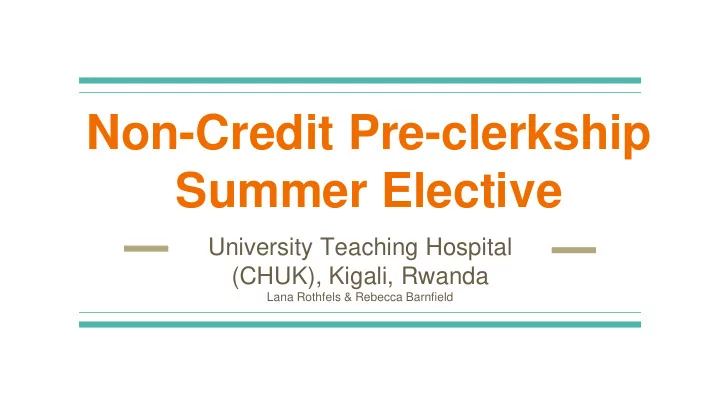

Non-Credit Pre-clerkship Summer Elective University Teaching Hospital (CHUK), Kigali, Rwanda Lana Rothfels & Rebecca Barnfield
Rwanda ● Population: 11,610,000 (2015) ● GDP per capita: 702 USD ● Currency: Rwandan Franc ○ Conversion $1 CA = ₣ 670 ● Language: Kinyarwanda ○ Post-1994 genocide: Children learn English in school ○ Older generation learned French ● Climate: Dry season (June-Sept) - Hot, sunny and dry during the day; a bit cooler at night ● Landscape: Country of a thousand hills
Kigali ● Population: 859,000 ● Comprised of many neighborhoods, large downtown ● Geographically small - can get anywhere by moto in 15 minutes ● Relatively safe (normal precautions necessary) ● Many large markets, great restaurants and cafés ● HUGE expatriate community ○ Trivia at pizza restaurant Monday night ○ Volleyball Tuesday nights ○ Art gallery yoga class Wednesday night ○ Live music at art gallery Thursday nights
Health and Healthcare in Rwanda ● Life expectancy at Birth: Males – 61; Females – 71 ● Near-Universal health coverage: Mutuelle de Santé ○ Tiered premiums based on incomes ○ High coverage rate: >90% by 2010 ● Making great improvements in health outcomes!!! http://www.who.int/gho/countries/rwa.pdf
CHUK - University Teaching Hospital of Kigali ● Tertiary-care hospital (receives referral from district hospitals) ● Academic language is English ○ Patients predominantly speak Kinyarwandan ● Many local and international medical and nursing students ○ Belgium, Germany, France mostly ● Attended rounds, academic afternoons, department meetings ● Hospital canteen lunch was less than $3CDN!!!
Our clinical experiences ● Lana: Paediatric surgery, paediatric cardiology ○ ‘Take Aways ’ : Language barrier was difficult, don’t be afraid to ask questions (some residents are less inclined to teach without being prompted) and switch specialties by talking to the department chair directly if you want a variety of experience Top: Neuroblastoma ● Rebecca: Obstetrics & gynaeocology, Bottom: Gangrene after failure to remove tourniquet emergency medicine ○ ‘Take Aways ’ : Try to stick with local students or residents who can translate especially when invasive physical exams required; I learned a lot attending M&M rounds, case presentations etc.; First cohort of emergency physicians in Rwanda just completed their residency this summer!
What to Bring For all specialties: ● White coat ● Name tag Other helpful items: ● Stethoscope • Note book For surgical specialties: • Toilet paper (not many washrooms have it) ● Scrubs • Hand sanitizer ● Surgery shoes (crocs) • Extra pens
Accommodations ● Ivuka Arts Studio ○ Found on AirBnB, in Kacyiru neighbourhood (great location) ○ Local artists working in the studio during the day ○ Made friends we would not have met otherwise! ● Other students lived in Convent beside hospital or in Kimihurura with other expats
Local Travel
Questions? Email: rbarnfield2020@meds.uwo.ca or lrothfels2020@meds.uwo.ca
Recommend
More recommend